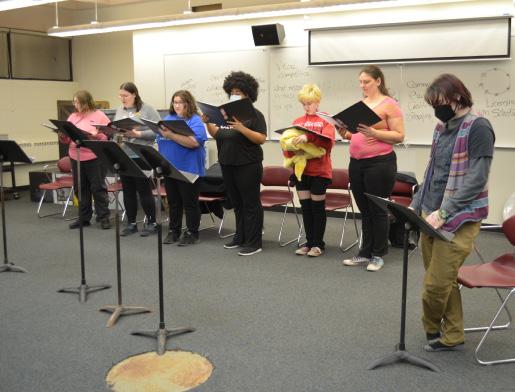
1 minute read
BSU’s Masquerade Black Ball results
from Issue 3
BY KIYANNA NOEL Arts & Culture Editor
Black Onyx: The Black Student Union hosted their eighth annual Mr. and Mrs. BSU Pageant Feb 25 in the Warren Ballrooms at the Angell College Center.
Advertisement
Hosted by David Harris and Samuel Atuahene, the doors were open at 6 p.m. but the event itself did not start until 7:45 p.m.
The first performer of the evening was student Evans D’Pulpit playing several Rihanna songs on the piano while salads were served by Chartwells.
To kick off the show, Harris and Atuahene introduced judges, Vice President of Diversity, Equity and Inclusion Allison Heard, Multicultural Student Success Coach Travis Gorham and Educational Opportunity Program Counselor Arlis Garcia.
Contestants were then welcomed to the stage four at a time to introduce themselves to the audience and the judges.
The first group was Rashad Nicholas, Nochamy Bamba , Michael Gaines and Ohemaa Owusu-Poku.
In their introductions, each contestant was given the opportunity to introduce themselves and explained their social movements.
Nicholas’ movement was the underlying mental health of Black men in today’s society.
“The social movement that I’m doing is mental health for Black men. That’s a topic that’s not really talked about a lot mainly because for men, it’s hard for us to open up about our feelings. Personally, it was always hard for me at a young age to deal with it,” Nicholas said. Throughout his speech, Nicholas explained the pressures he faces in his family and how his mental health played a big role in either keeping him motivat- ed or stagnant.
Bamba spoke about her experience in the dance world in New York City. She explained how her dream was to be a dancer and how she was constantly rejected by dance companies because of her skin color. Bamba’s social movement was “inequality and racism within Black dancers.”
Gaines’ social movement was Post-Traumatic Stress Disorder within the Black community. He elaborated on how he lives with PTSD in his day to day life.
“I chose this movement because it resonated with me,” Gaines said. “Despite having PTSD, I honestly believe that I always have room to grow and live this life the best way I can.”
Owusu-Poku’s social movement was the Anti-Apartheid Movement. In her introduction, she explained how Nelson Mandela could turn a “no” into a “yes” and how she turned around and did the same thing when it came to her education.
The next four contestants to present their social movements were Michael Johnson, Sydney Wise, Jaherah Seales and graduate-student Ayesha Abdallah.
Johnson introduces himself by









